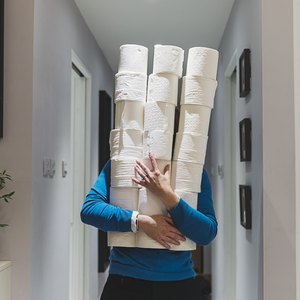
If you’ve gone to the grocery recently, chances are you’ve noticed some empty shelves where aisles and aisles of well-stocked shelves used to be. Because of the spread of the novel coronavirus, SARS-CoV-2, consumers are rushing to grocery stores around the globe to stock up on everything from toilet paper and hand sanitizers to milk and shelf-stable foods. It’s not hard to understand people’s compulsion to stock up and provide for their families during these unprecedented times, but there is a psychology behind stockpiling and the empty shelves you may be experiencing.
Read More: How to Stock a Pantry for a Year
Why People Panic Buy
One of the most obvious reasons people panic buy is because they feel as if they’re ill-prepared and want to take care of themselves and their families. But, also because people want to take back some control they may feel they have lost in a situation. According to UC San Diego neuroeconomist, Uma Karmarkar, “When people feel uncertain, they tend to focus on things that bring them certainty. Most of us don’t have the ability to make new vaccines or enact new policies, but the one action that we can control, that feels like we are doing something, is to stock up on supplies,” she says.
Panic-buying, however, is by no means a new phenomenon. The urge to stockpile supplies happens before people prepare to hunker down for hurricanes in Florida or ahead of other natural disasters. However, because humanity has no previous experience with this novel coronavirus, people are unsure about how to prepare for it, so the tendency to over-purchase certain items is very real. With natural disasters, for example, people know what to expect and how to prepare because they have likely experienced them before. This virus, on the other hand, has people questioning how long it will last.
The Role of Fear
When there are fears of the supply chain experiencing a few hiccups, or worse, collapsing, people will hoard. “It’s a natural response to a stressful experience,” says Lisa Kath, an associate professor of psychology at San Diego State University. “With this, we don’t yet know the boundaries,” says Kath. “We have no frame of reference. That just amplifies the fear.” It is this fear of the unknown that causes people to purchase “more than they buy during Christmas,” said President Trump in a recent Coronavirus Task Force press briefing.
However, when government officials try to ease the public’s fears over food and other supply chain shortages, this action often has the opposite effect – it causes people to go out and buy more. There have been hoarding spikes after the World Health Organization declared a pandemic on March 11th and after state governors have recommended people limit their movements to necessary outings.
Personal Finance Implications
Another effect of panic-buying that few people may consider is its toll on your personal finances. Panic-buying is generally an unplanned expense you didn’t budget for. These are the types of purchases that can throw your budget completely out of whack. When you panic buy, you are likely not only buying more than you need, but more than you even intended to. You’re also probably purchasing items based on what’s available without taking cost in mind.
If you’re a shopper who usually uses coupons or store club cards, you’re more likely to grab whatever is available, regardless of price, when you panic buy because you’re fearful someone will snatch up that 12 pack of toilet paper while you waffle on the price. And, this behavior can lead to buyer’s remorse. In fact, many outlets like big box giant, Costco, are not accepting returns or refunds on many of the recently most-stockpiled items such as toilet paper, rice, soap and hand sanitizer.
Sensibly Stockpiling Goods
Having an extra supply of food on hand, however, is never a bad idea. As evidenced by the current spread of the novel coronavirus, it pays to have a backup plan. When you have a well-stocked pantry, you can avoid needing to go out into crowded, rowdy markets. Building a stocked pantry doesn’t have to cost a lot of money and you can add more items gradually every time you do your usual shopping.
By adding shelf-stable foods and other household necessities a little at a time, you’re more likely to find these items on sale or have coupons for them, and can buy them in bulk without putting a strain on supply chains in an emergency. Also, always be sure to buy things that you or your family will actually use. If your family doesn’t drink milk, then there’s probably no need to buy 20 boxes of powdered milk just because it’s on sale.
Read More: How to Build a Weekly Meal Plan on a Budget
References
- Psychology Today: How Panic Buying Affects Our Personal Finances
- San Diego Tribune: Why We Hoard – Fear at Root of Panic-Buying, Psychologists Say
- The White House: Remarks by President Trump, Vice President Pence, and Members of the Coronavirus Task Force in Press Briefing
- Business Insider: Costco Stores Ban Returns on Toilet Paper, Soap Amid Coronavrus Panic
- Pocketsense: Cheap Meals for People on a Budget
- Pocketsense: How to Control Toilet Tissue Usage
- Pocketsense: How to Save Money on Paper Towels
Writer Bio
Tara Thomas is a Los Angeles-based writer and avid world traveler. Her articles appear in various online publications, including Sapling, PocketSense, Zacks, Livestrong, Modern Mom and SF Gate. Thomas has a Bachelor of Science in marine biology from California State University, Long Beach and spent 10 years as a mortgage consultant.
